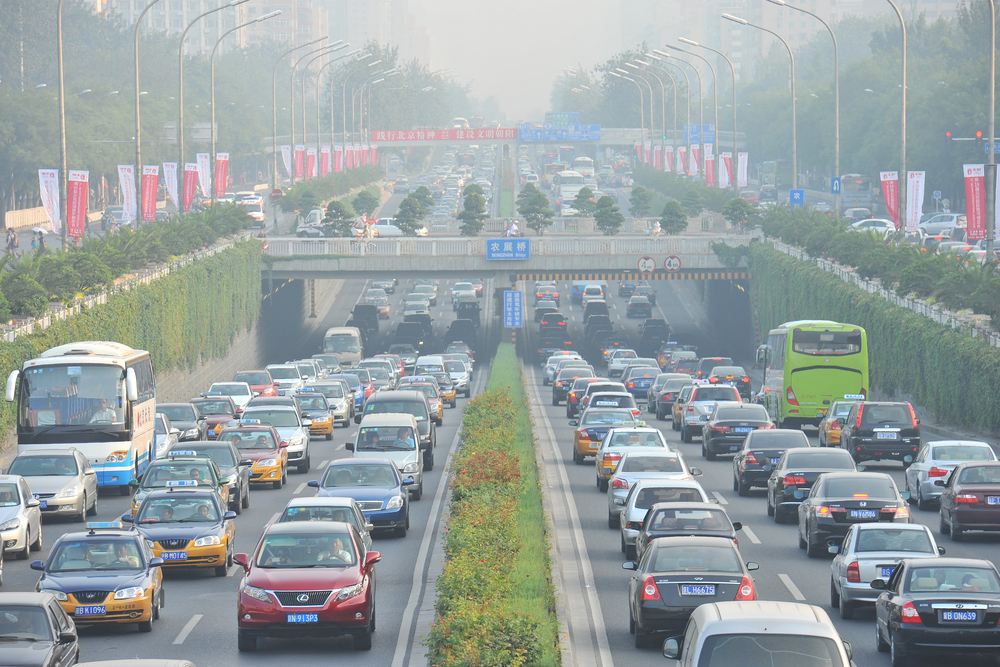Environment: Environmental Issues
The People's Republic of China, the world's most populous country, is facing a number of pressing environmental issues that are affecting its people and ecosystems. The following is a list of some of the key environmental issues facing China:
- Air pollution: Air pollution is a major problem in many of China's cities, with particulate matter, nitrogen oxides, and sulfur dioxide levels often exceeding World Health Organization guidelines.
- Water pollution: The country's rapid industrialization has led to widespread water pollution, which is affecting the health of its people and ecosystems, with rivers and lakes contaminated by industrial and agricultural waste.
- Soil degradation: China's soil is being degraded by industrialization, deforestation, and over-farming, leading to soil erosion, infertility, and desertification.
- Deforestation: Deforestation is a growing problem in China, with large areas of forest being cleared for agriculture and urbanization.
- Waste management: Waste management is a major challenge in China, with its growing population generating huge amounts of waste, much of which ends up in landfills.
- Climate change: China is one of the world's largest emitters of greenhouse gases and is being affected by the impacts of climate change, including more frequent and intense heat waves, droughts, and floods.
China is facing a number of complex and interconnected environmental challenges, and addressing these will require a multi-faceted approach, involving the government, businesses, and citizens.
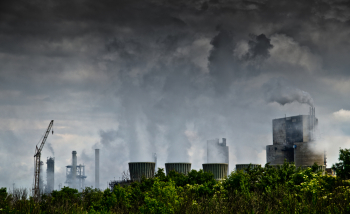
Air Pollution
Air pollution is a major environmental issue in China, affecting both the health of citizens and the overall quality of the country's natural environment. The effects of air pollution in China are numerous and far-reaching.
- Health effects: Air pollution in China is known to cause a variety of health problems, including respiratory and cardiovascular disease, lung cancer, and premature death. The fine particulate matter and other harmful pollutants in the air have been linked to these health issues. For example, in China, it can be particularly severe for people who are already vulnerable due to age, illness, or other factors.
- Environmental effects: Air pollution in China can have a number of effects on the environment, including the loss of biodiversity, acidification of soils and water bodies, and changes to the atmosphere. For example, the deposition of pollutants on the land and in waterways can impact plant and animal species, while acid rain can harm sensitive ecosystems such as forests, lakes, and rivers.
- Agricultural effects: Air pollution can also affect agricultural productivity, including the growth and health of crops and livestock. For example, the deposition of pollutants on crops and soil can reduce yields, while exposure to pollutants can cause harm to livestock and impact their health and productivity.
- Economic effects: Air pollution can also have significant economic impacts, including decreased productivity and increased healthcare costs. For example, the increased burden on healthcare systems from air pollution-related illness and death can lead to higher healthcare costs, while lost productivity due to illness or death can negatively impact businesses and the overall economy.
- Visibility and aesthetics: In addition to its health and environmental effects, air pollution can also have a significant impact on visibility and aesthetics. For example, haze and smog caused by air pollution can reduce visibility and detract from the beauty of the environment, impacting tourism and outdoor recreation.
In conclusion, air pollution in China has numerous and far-reaching effects on the environment and health, as well as the economy. Addressing this critical issue will require a concerted effort from the government, industry, and citizens to reduce emissions, improve air quality, and protect public health and the environment.
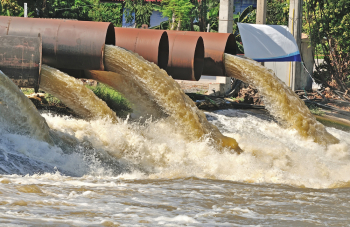
Water Pollution
Water pollution is a major environmental issue in China, affecting the country's rivers, lakes, and coastal waters. The sources of water pollution in China include industrial activities, agricultural runoff, and sewage discharge.
- Adverse effects on aquatic life: Water pollution can harm or even kill aquatic life, including fish, amphibians, and shellfish, affecting the biodiversity and food chains in water bodies. For example, the discharge of heavy metals into rivers has caused widespread death of fish and other aquatic species in China.
- Health hazards for humans: Consuming contaminated water can lead to serious health problems, such as gastrointestinal illnesses, liver and kidney damage, and even cancer. For example, the presence of toxic chemicals in drinking water in some areas of China has led to a high incidence of cancer and other health problems among the local population.
- Decline in water quality: Polluted water can harm the quality of the water, making it unsuitable for drinking, irrigation, or recreation. The Yellow River, one of the largest rivers in China, has become so polluted that it's now referred to as the "Mother of Sorrows."
- Reduction in water availability: Water pollution can reduce the availability of water, making it difficult for farmers to irrigate their crops and for urban residents to access clean drinking water. This can lead to water shortages, decreased food production, and economic losses.
- Negative impact on tourism: Water pollution can also harm the tourism industry, as tourists may avoid areas with contaminated water. For example, the highly polluted lake Taihu in China has become a source of national embarrassment, as tourists avoid it due to its foul smell and appearance.
- Ecosystem degradation: Water pollution can disrupt ecosystems, leading to declines in biodiversity and altering the balance of species in aquatic environments. For example, the pollution of the Yangtze River in China has had a significant impact on the survival of the Yangtze River dolphin, which is now considered extinct.
In conclusion, water pollution in China is a serious issue with far-reaching effects on both the environment and human health. Addressing this issue will require the implementation of effective regulations, the use of new technologies to reduce pollution, and increased public awareness and education.

Soil Degradation
Soil degradation is a significant environmental issue in China, resulting from a combination of factors such as overuse of agrochemicals, deforestation, and erosion. The following are some of the specific impacts of soil degradation in China:
- Decreased soil fertility: The overuse of fertilizers and other agrochemicals can lead to soil infertility, which can limit the growth and productivity of crops. For example, in some areas of China, the soil has become so depleted of nutrients that it can no longer support even basic crops.
- Erosion: Erosion caused by deforestation and overgrazing can cause the topsoil to be washed away, reducing the amount of fertile soil available for growing crops. This can result in decreased agricultural productivity and, in some cases, land abandonment.
- Water pollution: Soil degradation can lead to water pollution, as contaminated soil particles are washed into rivers and lakes, affecting the quality of drinking water and aquatic ecosystems. Many of China's rivers and lakes are contaminated with heavy metals and other pollutants due to soil degradation.
- Biodiversity loss: Soil degradation can also lead to the loss of biodiversity, as it reduces the number of habitats available for wildlife and plants. In areas of China where soil degradation has been severe, many species of birds and other wildlife have disappeared.
- Climate change: Soil degradation can contribute to climate change by reducing the amount of carbon stored in the soil. This can lead to increased atmospheric carbon dioxide levels and contribute to global warming.
- Flooding and landslides: Soil degradation can also increase the risk of flooding and landslides, as the soil is less able to absorb and hold water. This can lead to increased damage and loss of life during heavy rains and natural disasters.
In conclusion, soil degradation has far-reaching impacts on China's environment and society. Addressing this issue requires a multi-faceted approach that includes reducing the overuse of agrochemicals, protecting forests and other habitats, and improving land management practices.
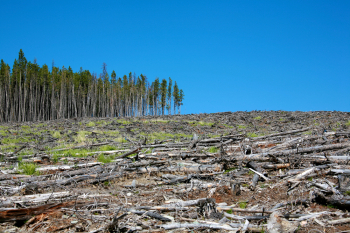
Deforestation
Deforestation has significant impacts on the environment and ecosystems, and China is no exception. The country's forests have been declining rapidly due to a combination of factors, including urbanization, agriculture, and illegal logging. Here are six specific effects of deforestation in China:
- Loss of biodiversity: Deforestation leads to the loss of habitats for many species, causing them to either become endangered or go extinct. For example, the bamboo forest in Sichuan, China, which was the habitat for the endangered Giant Panda, has been severely degraded due to deforestation.
- Soil erosion: Trees play an important role in preventing soil erosion, and without them, soil can become vulnerable to being carried away by wind and rain. In China, soil erosion caused by deforestation has led to the loss of fertile soil and decreased agricultural productivity.
- Desertification: Deforestation can also contribute to desertification, as trees help to retain moisture in the soil. In the northern regions of China, deforestation has led to an increase in desertification, which has affected local communities and agriculture.
- Water scarcity: Trees play an important role in regulating the water cycle, and deforestation can disrupt this process, leading to water scarcity. In some regions of China, deforestation has led to a reduction in the water table and increased water scarcity, affecting both humans and wildlife.
- Climate change: Deforestation releases carbon stored in trees into the atmosphere, contributing to global warming and climate change. For example in China, deforestation has contributed to the country's greenhouse gas emissions, which are among the highest in the world.
- Flooding: Trees play a role in mitigating the impacts of heavy rainfall, as they absorb and store water. In areas where deforestation has taken place, heavy rainfall can lead to increased flooding, affecting local communities and causing significant damage.
In conclusion, deforestation in China has far-reaching impacts on the environment and ecosystems. From loss of biodiversity and soil erosion to desertification and flooding, the effects of deforestation are significant and can have lasting impacts. It is important to take action to prevent and mitigate these impacts by promoting sustainable forestry practices and reforestation initiatives.
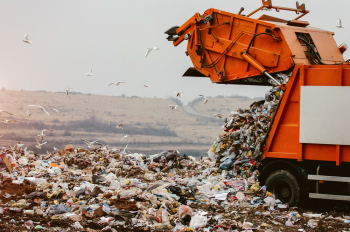
Waste Management
Waste management is a crucial issue in China, as the country generates large amounts of waste and faces challenges in effectively managing and disposing of it. Poor waste management practices can have serious impacts on the environment, public health, and ecosystems. Here are six specific effects of waste management in China:
- Pollution of air, water, and soil: Improper disposal of waste can lead to the release of pollutants into the air, water, and soil, causing serious environmental problems. For example, in China, waste incineration and landfills have been linked to air and water pollution, affecting local communities and ecosystems.
- Health impacts: Poor waste management practices can also have serious health impacts, as hazardous and toxic waste can contaminate food and water sources, leading to serious health problems. For example, in some regions of China, there have been reports of high levels of heavy metals and other toxic pollutants in groundwater near waste disposal sites.
- Loss of biodiversity: Waste can also have impacts on wildlife and ecosystems, causing declines in biodiversity. Improper disposal of electronic waste has led to the release of toxic chemicals into the environment, affecting local wildlife and ecosystems in China.
- Soil contamination: Waste that is not properly disposed of can contaminate soil and make it unsuitable for agriculture. In China, soil contamination near waste disposal sites has affected agricultural productivity and food security.
- Resource depletion: Improper waste management can also lead to the depletion of resources, as valuable materials are not properly recycled and are instead sent to landfills. For example, in China, this has resulted in the loss of valuable resources, such as metals and plastics, and increased dependence on imports.
- Environmental injustice: Poor waste management practices can also have disproportionate impacts on marginalized communities and low-income populations, leading to environmental injustice. For example, in China, there have been reports of waste disposal sites being located near low-income communities, exposing residents to serious health and environmental risks.
In conclusion, waste management is a critical issue in China, and poor waste management practices can have serious impacts on the environment, public health, and ecosystems. Effective waste management practices, including reduction, reuse, recycling, and safe disposal, are crucial to mitigate these impacts and ensure a cleaner and healthier future.

Climate Change
Climate change is a global phenomenon that is having significant impacts on the environment and ecosystems, and China is no exception. The country is one of the largest emitters of greenhouse gases and is facing a range of impacts as a result of a changing climate. Here are six specific effects of climate change in China:
- Rising temperatures: Climate change is leading to rising temperatures, which can have significant impacts on agriculture, forestry, and other industries. For example, in China, rising temperatures have led to decreased crop yields, increased water stress, and increased frequency of heatwaves.
- Sea-level rise: Climate change is also causing sea-level rise, which can have serious impacts on coastal communities and ecosystems. In China, sea-level rise is threatening coastal cities, including Shanghai, and is leading to increased salinization of agricultural lands.
- Increased frequency and severity of extreme weather events: Climate change is leading to increased frequency and severity of extreme weather events, such as hurricanes, typhoons, and heavy rainfall events. In China, these events have caused significant damage to infrastructure and communities and have disrupted transportation and other services.
- Glacier retreat: Climate change is also causing glacier retreat, which can have significant impacts on water resources and hydropower. For example, in China, glacier retreat is affecting water supplies and contributing to the country's energy mix.
- Degradation of ecosystems: Climate change can also lead to the degradation of ecosystems, as changes in temperature and precipitation patterns alter the distribution of species and habitats. For example, in China, degradation of ecosystems has led to declines in biodiversity and the loss of important habitats for wildlife.
- Ocean acidification: Climate change is also causing ocean acidification, which can have serious impacts on marine ecosystems and the organisms that depend on them. For example, in China, ocean acidification is affecting the country's marine fishing industry, and is contributing to declines in fish populations and other marine species.
In conclusion, climate change is having significant impacts on the environment and ecosystems in China, and these impacts are likely to become more severe in the future. Addressing climate change will require a concerted effort at the global and national level, including reducing greenhouse gas emissions, increasing energy efficiency, and adapting to the impacts of a changing climate.
Copyright © 1993—2025 World Trade Press. All rights reserved.

 China
China 